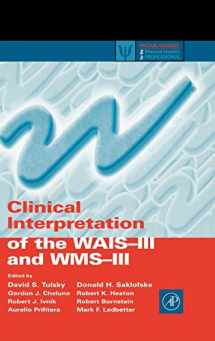
Clinical Interpretation of the WAIS-III and WMS-III (Practical Resources for the Mental Health Professional)
Book details
Summary
Description
This guide to the WAIS-III and WMS-III tests is written to help clinical practitioners achieve efficient and accurate interpretations of test results. The only interpretive guide to be based on data obtained while standardizing the tests, this reference source provides new models for interpreting results, as well as practical information on the diagnostic validity, demographically corrected norms, and accuracy of the tests in measuring intelligence and memory.
The focus of information is to allow clinicians to reduce variance in the interpretations of scores, indicating how best to factor in socio-economic status of respondents, interpreting meaningful change in serial assessments, and scoring with alternate or omitted sub-tests. Also included in the book are chapters on accommodating clients with disabilities. The final chapter discusses frequently asked questions (with answers) on the use and interpretation of the tests, as well as practical issues to help make scoring time-efficient and accurate.


We would LOVE it if you could help us and other readers by reviewing the book
Book review



